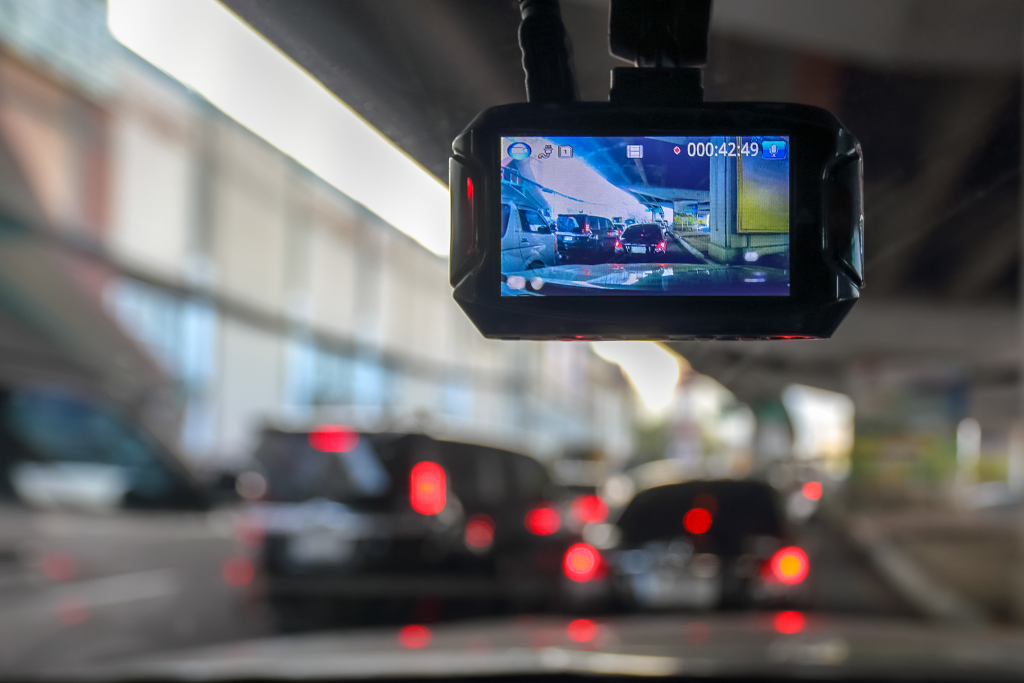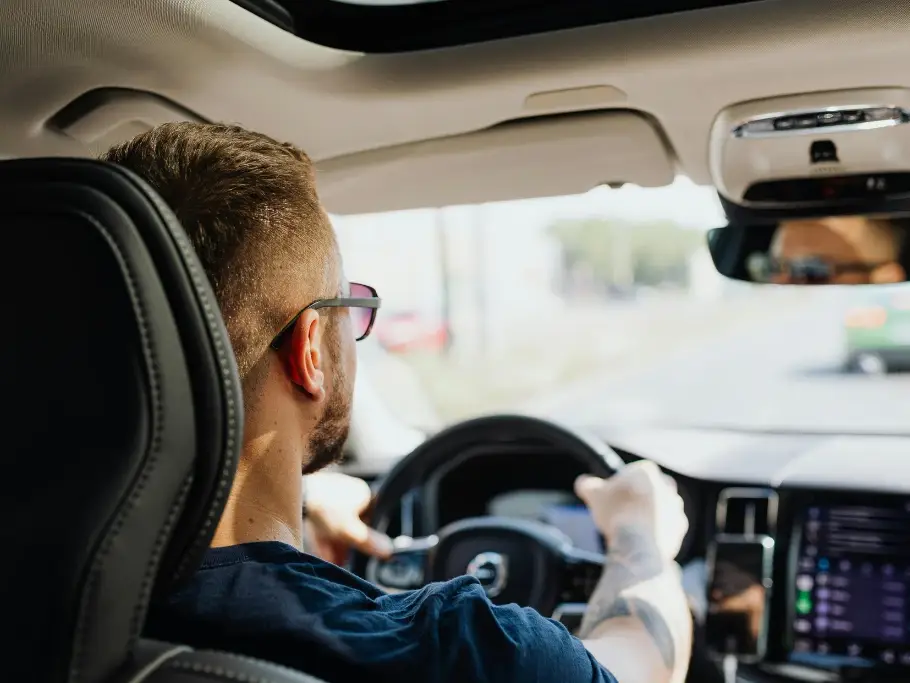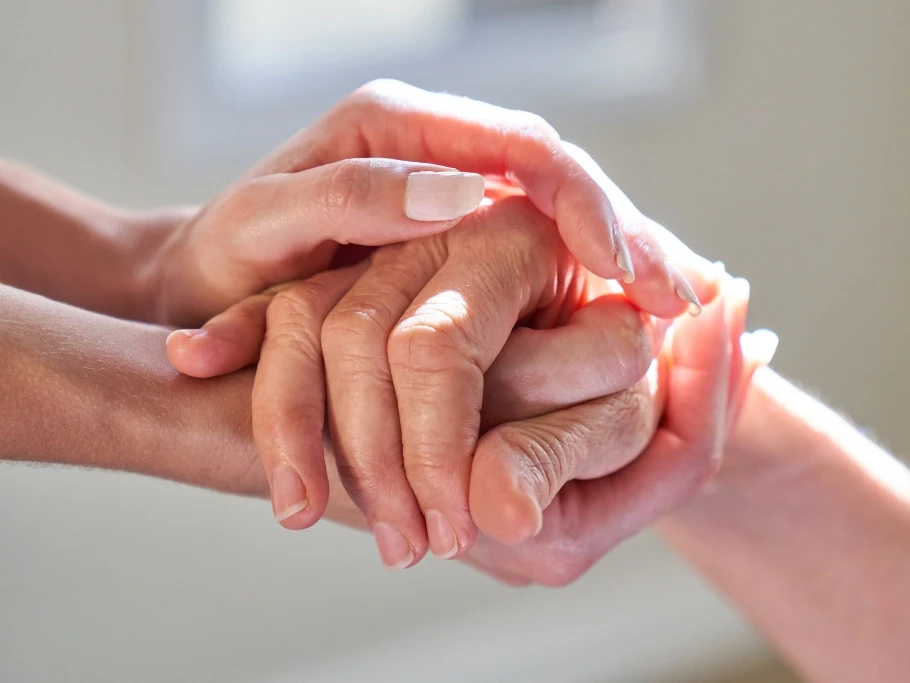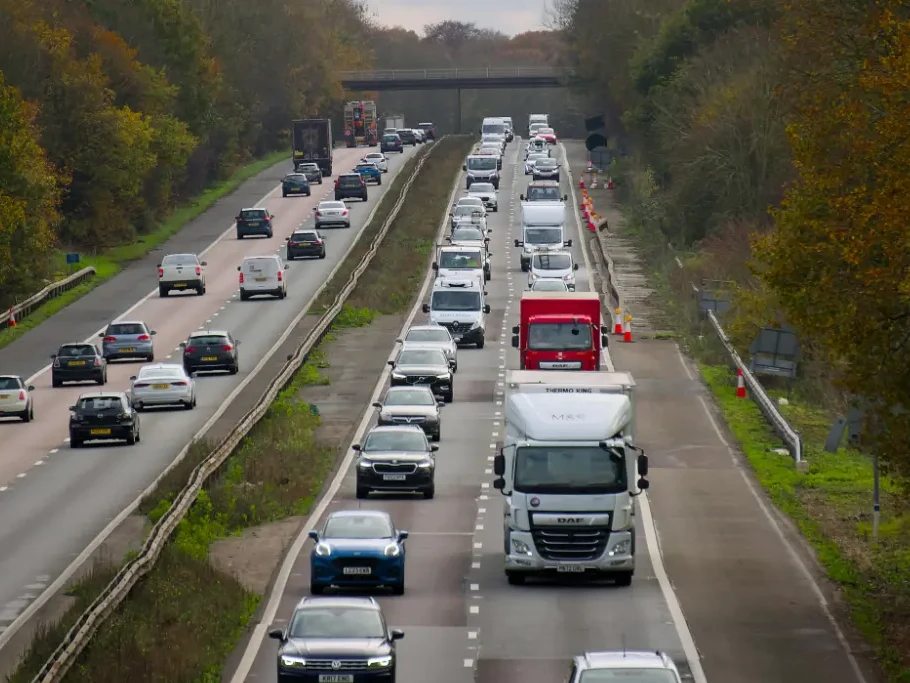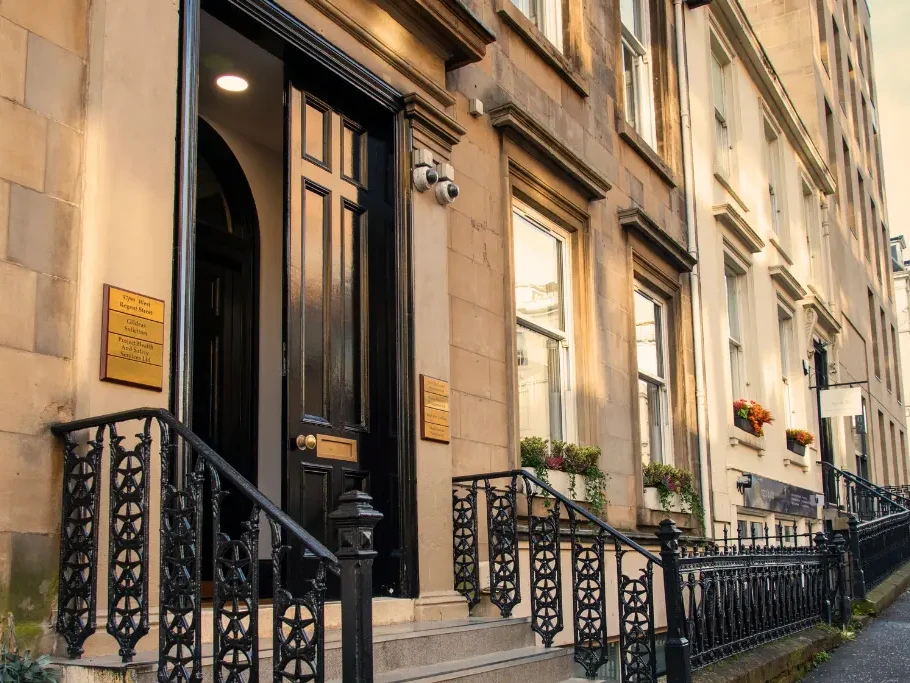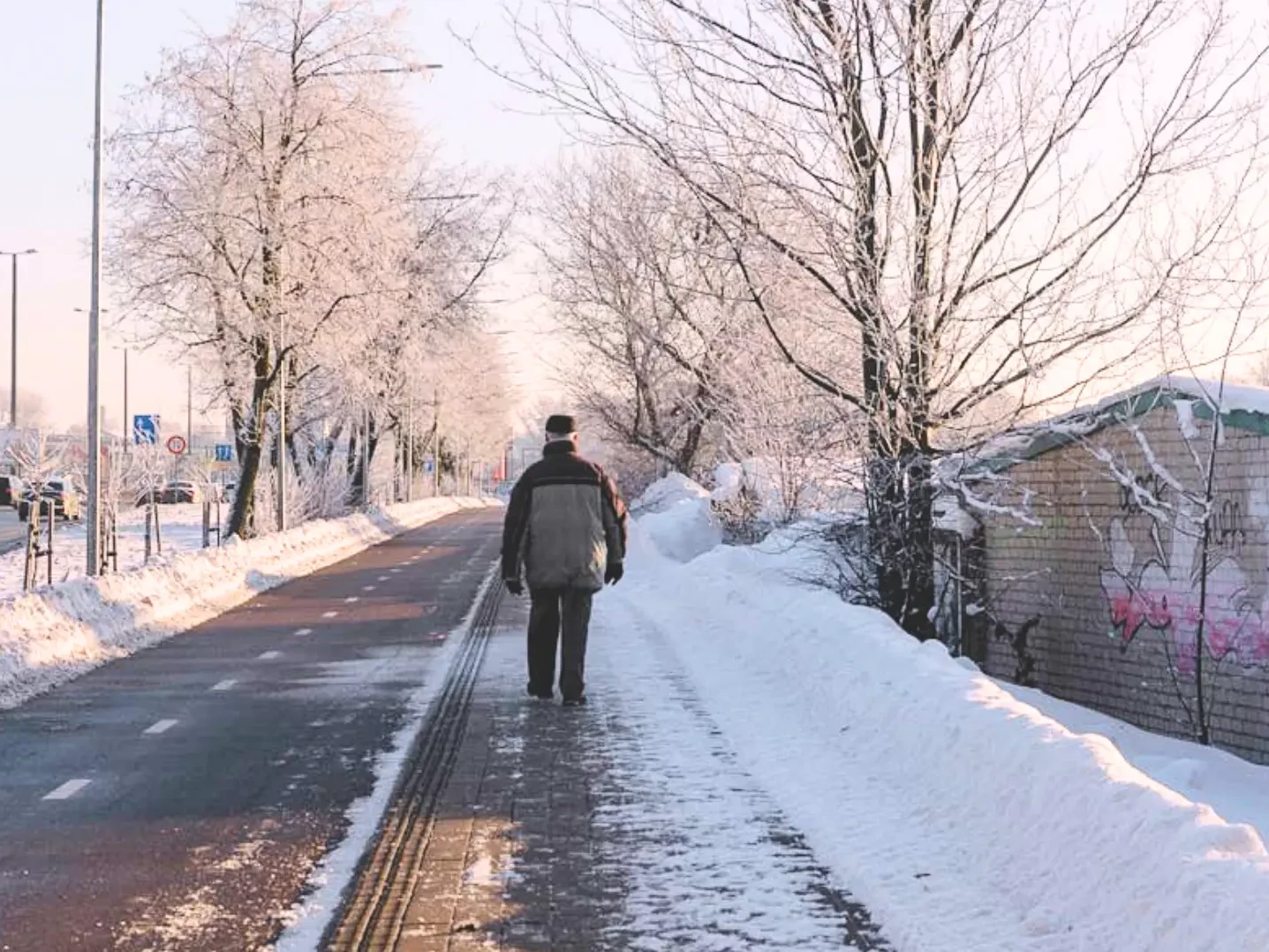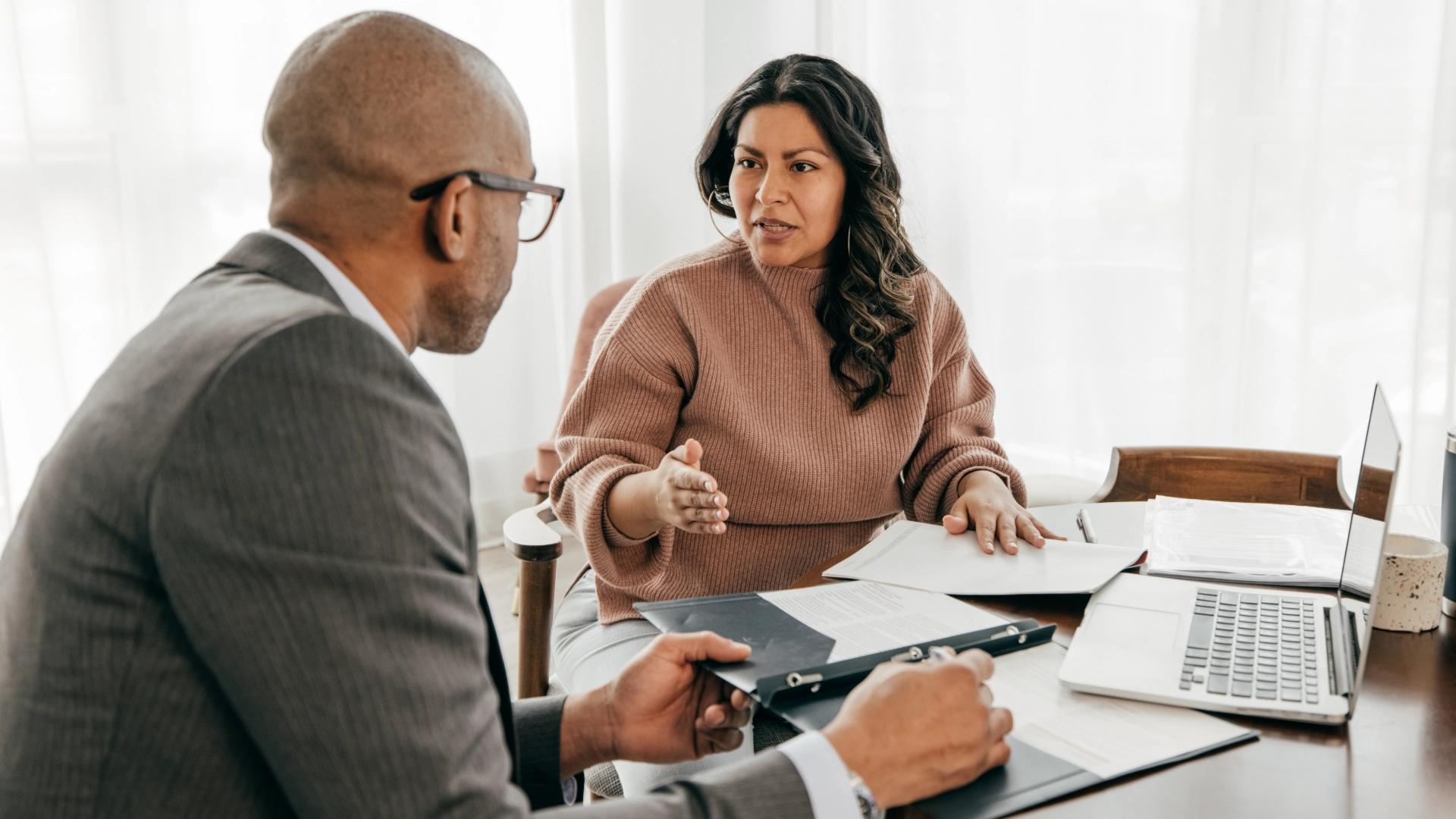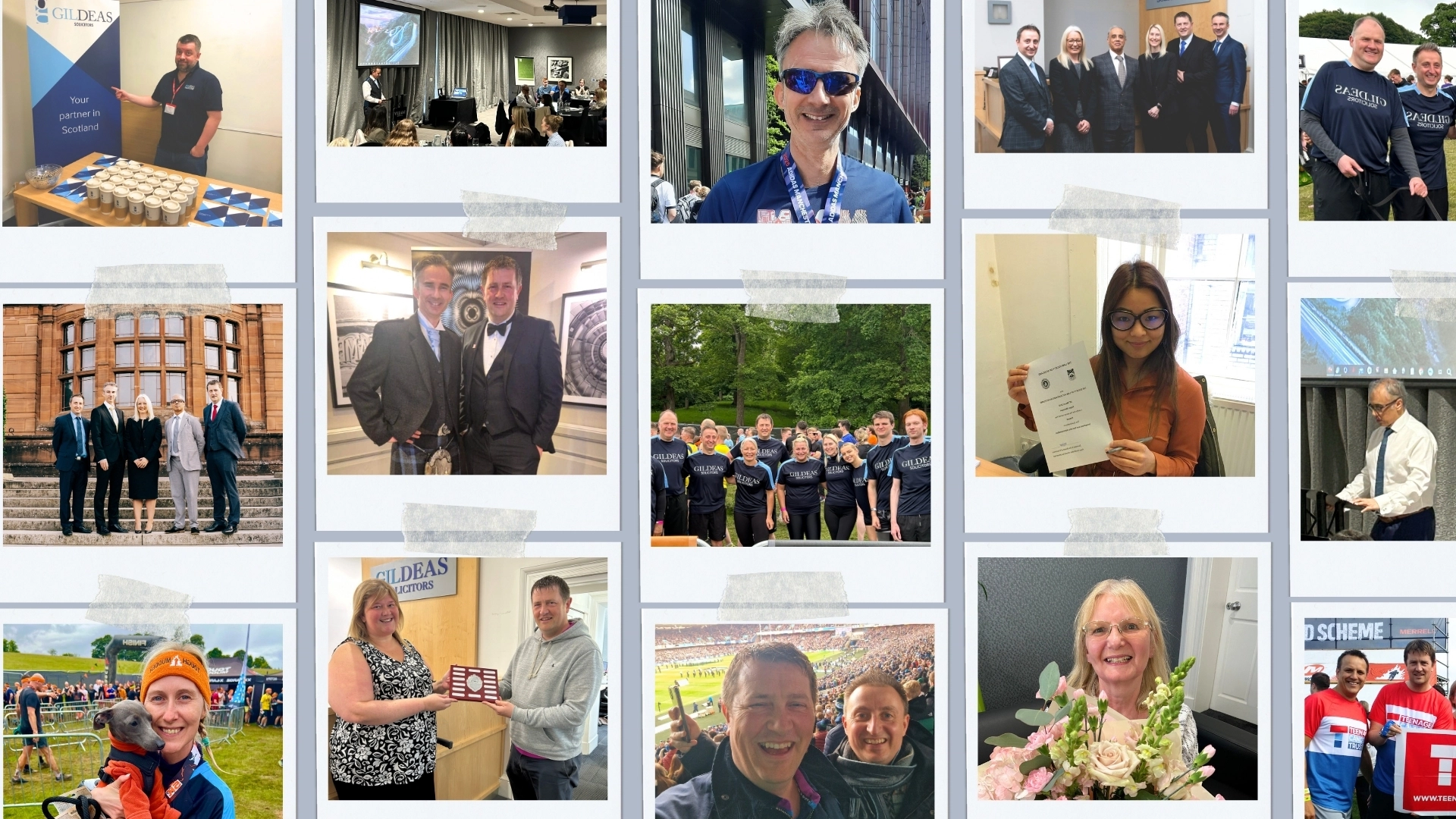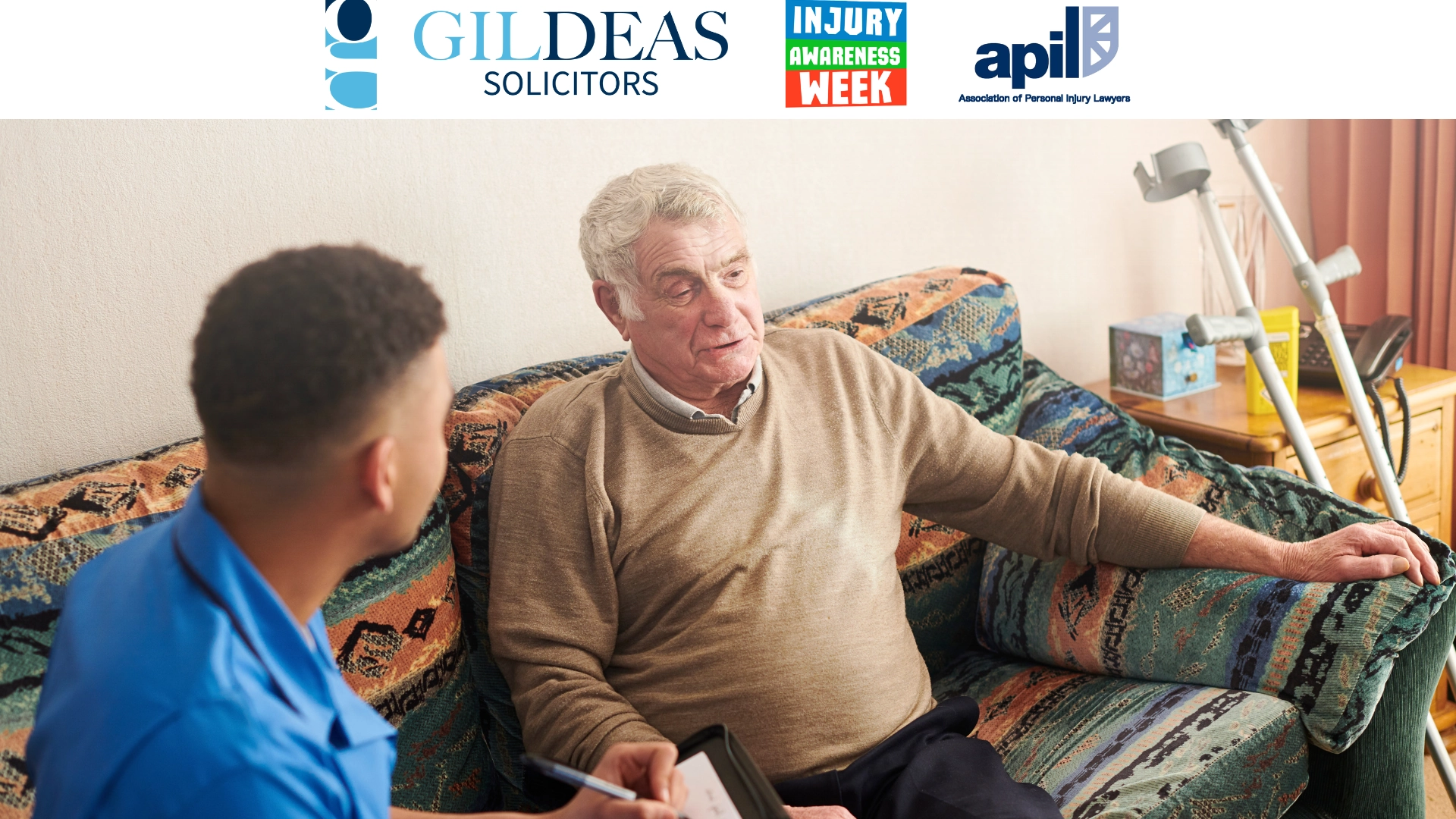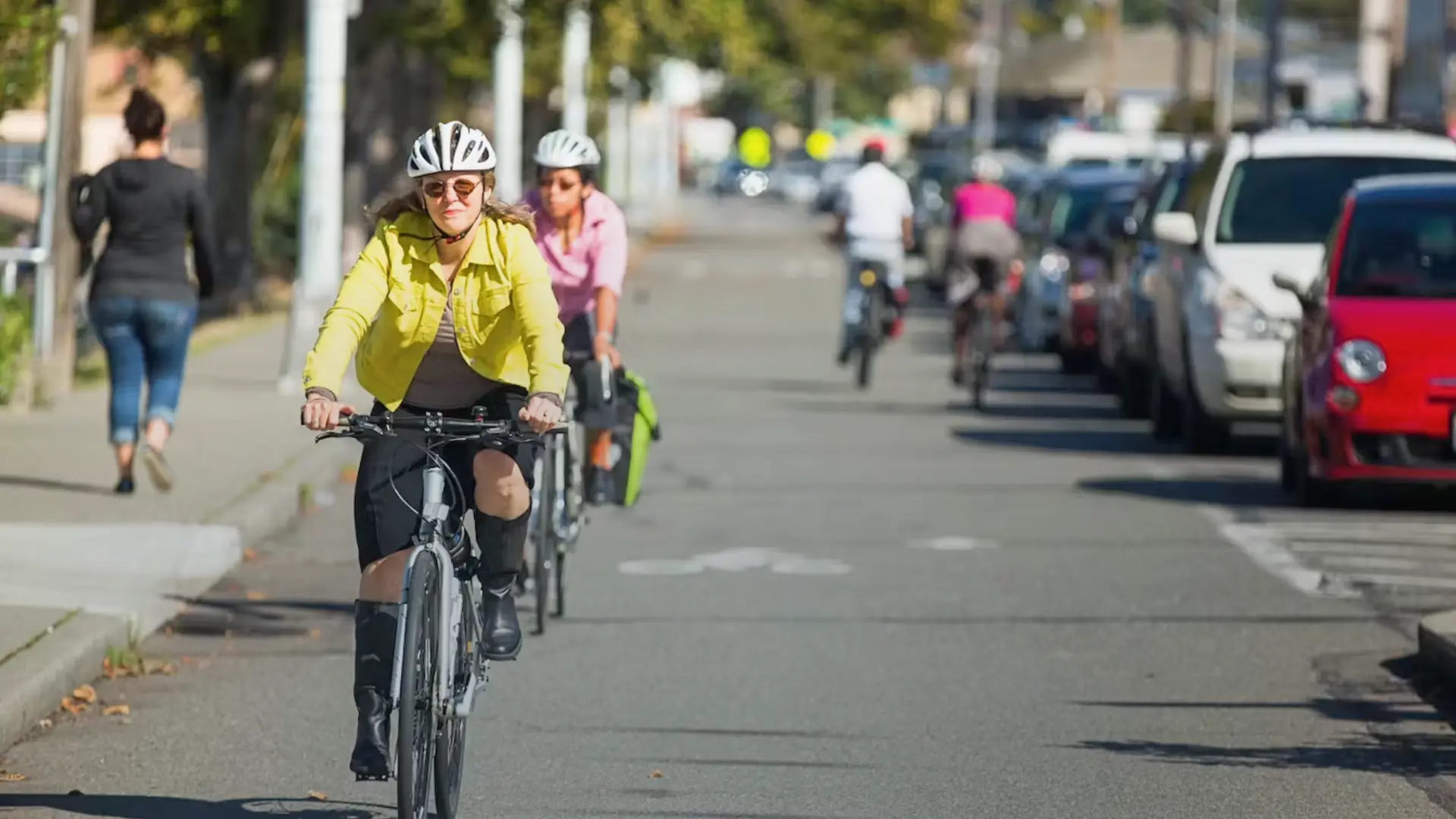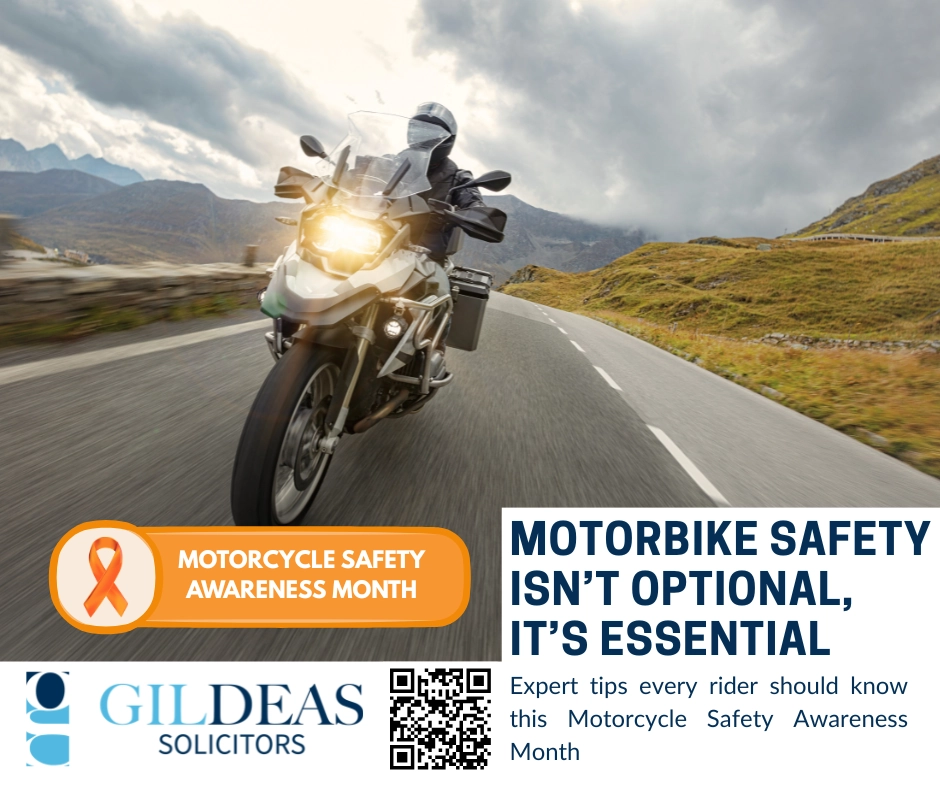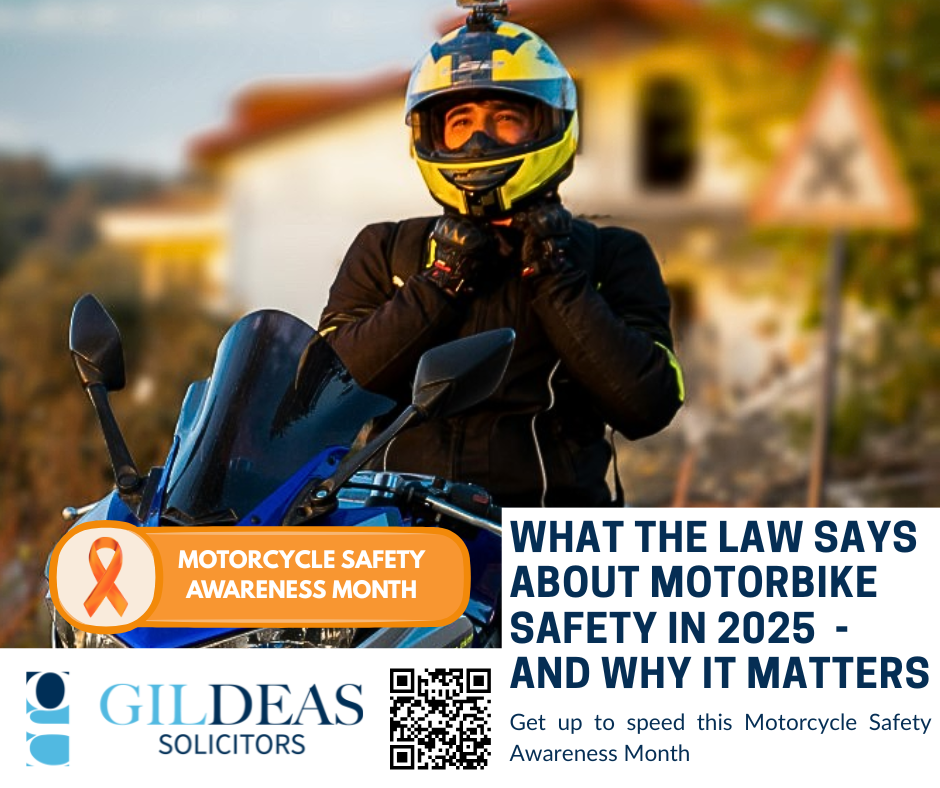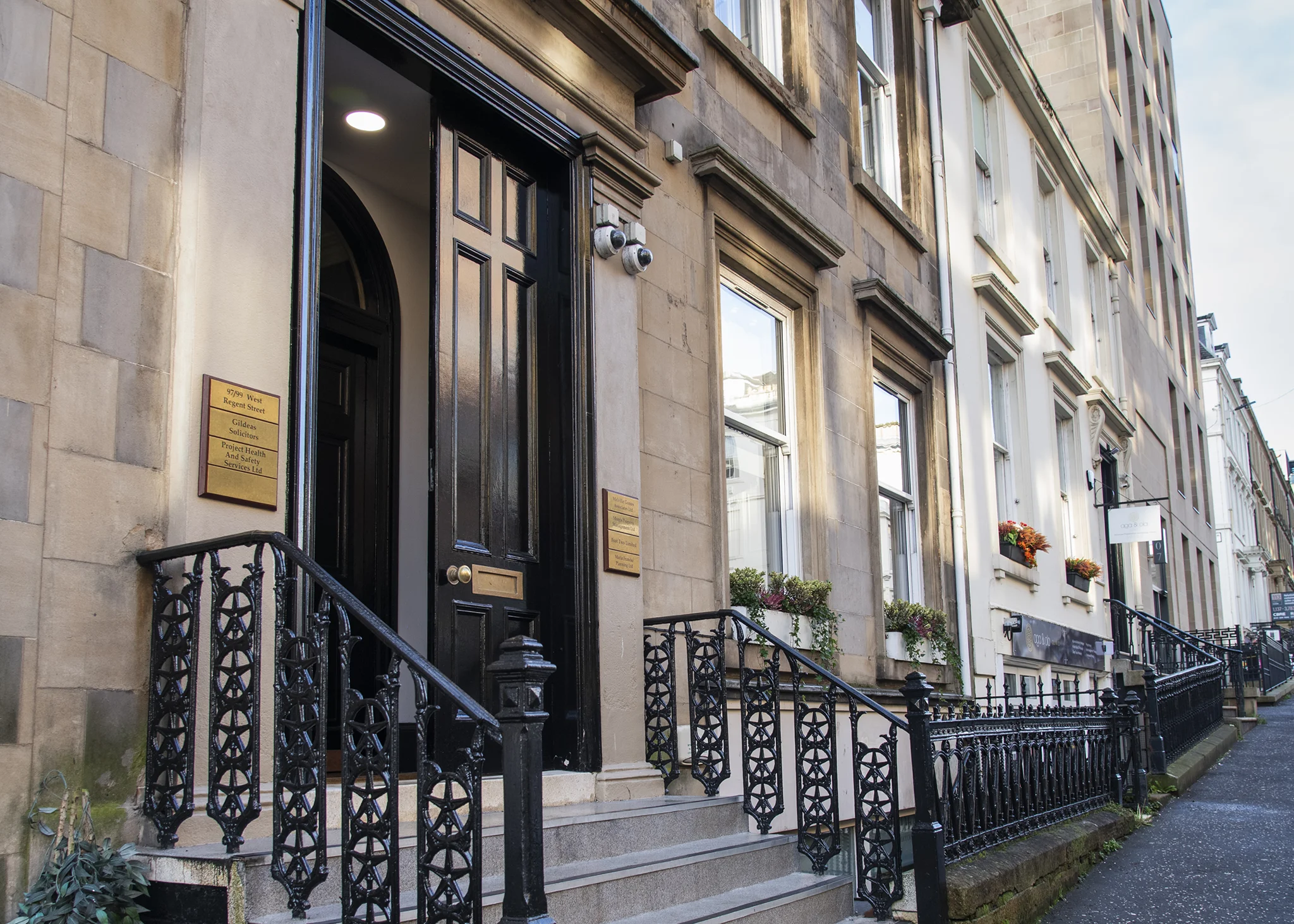National Dash Cam Day 2025: Why You Shouldn’t Drive Without One
- Home
- Archive by Category "Gildeas"
Share this article
National Dash Cam Day falls on 4 August, giving us the opportunity to spotlight how dash cams and helmet cameras are improving road safety across the UK.
With millions of motorists and cyclists now using recording devices, these cameras are becoming an increasingly important tool for deterring dangerous driving and supporting legal claims after an accident.
What Is a Dash Cam?
A dash cam is a compact video camera mounted to a vehicle’s dashboard or windscreen. It records everything that happens on the road ahead and sometimes behind.
Helmet cameras, commonly worn by cyclists and motorcyclists, serve the same purpose but from the rider’s point of view. They are particularly useful for vulnerable road users who can face greater risks on the road.
Dash Cam Use Is at Record Levels
UK roads are seeing a surge in dash cam usage. According to the National Dash Cam Safety Portal:
• Over 24,000 reports were submitted to police using dash cam footage in the first half of 2024
• More than 135,000 motoring offences have been reported through the portal since 2019
• In 2023, dash cam and helmet cam footage submissions increased by 30%
• Nearly 70% of footage submissions led to police action, from warnings to prosecutions
These numbers show the growing trust the public places in dash cam footage as a reliable form of evidence.

Why More Drivers Are Installing Dash Cams
Research by UK dash cam manufacturer Nextbase reveals that 70% of British drivers believe dash cams should be standard in all vehicles. The reasons are clear:
• They help prevent dangerous driving by making road users more accountable and offer clear evidence in the event of an accident
• Some insurers reduce premiums for drivers who use dash cams
Many motorists also report feeling safer knowing their journeys are being recorded.
Proving Fault After a Collision
When an accident occurs, dash cam footage can be vital for proving what actually happened. It is especially useful when there are no independent witnesses, when drivers give conflicting accounts, or when an incident occurs in areas without CCTV.
Solicitors and police increasingly rely on dash cam footage to establish fault more quickly and fairly, which can lead to your claim settled faster and more successful prosecutions.
Helmet Cameras Help Protect Cyclists and Motorcyclists
Riders are often more seriously injured in collisions compared to car drivers. Helmet cameras give them a way to document incidents from their perspective.
In many cases, this footage may be the only available evidence of how a crash occurred, especially in areas with no witnesses or security cameras. Helmet cams are proving particularly valuable in urban areas, where close passes, dooring incidents and aggressive driving are more common.
How Dash Cam Footage Supports Personal Injury Claims in Scotland
At Gildeas Solicitors, we understand how vital clear evidence can be when pursuing a personal injury claim following a road traffic accident. Dash cam footage is increasingly playing a central role in helping our clients across Scotland secure fair compensation.
Whether you’re a driver, cyclist, or pedestrian, dash cam footage can help demonstrate exactly what happened during an incident. This is particularly useful when there are no independent witnesses, or where the parties involved give conflicting accounts.
In personal injury claims, it is crucial to establish who was at fault. We routinely request dash cam or helmet cam footage from clients and police reports. When necessary, we also work with accident reconstruction experts to review the footage in detail.
This evidence can make a significant difference in claims involving:
• Serious injury or long-term recovery needs
• Lost earnings due to time off work
• Access to specialist medical treatment or rehabilitation
• Bereavement or psychological trauma following a fatal collision
Dash cam footage can provide the clarity and confidence needed to move a case forward, particularly in situations where liability is disputed.
As a firm with decades of experience representing clients throughout Glasgow, Edinburgh and across Scotland, we know how important strong evidence can be in a case.
If you’ve been involved in an accident and believe dash cam footage may help, we encourage you to contact Gildeas Solicitors as early as possible so we can begin gathering the necessary information.
Final Thoughts
While dash cams can’t prevent all accidents, they are helping to change driver behaviour. Knowing that reckless driving could be recorded and reported is encouraging more drivers to think twice before taking risks.
National Dash Cam Day is a reminder of just how important dash cams and helmet cameras have become on UK roads.
They help hold dangerous drivers to account, provide essential evidence in legal claims, and support a growing culture of responsibility and safety among road users.
Whether you’re behind the wheel or on two wheels, a dash cam could prove to be one of the most valuable tools you invest in this year.
Gildeas Solicitors is a recognised law firm specialising in personal injury claims, supporting you throughout Scotland from our offices in Glasgow and Edinburgh. We’re passionate about what we do, whilst putting our clients’ interests first. That’s why we make personal injury personal.
Considering our services? Call our dedicated team today on 0141 331 6070.
More to explore
Take Control of Your Claim: A Step-by-Step Guide to Choosing a Solicitor
- Home
- Archive by Category "Gildeas"
Share this article
Choosing the right personal injury solicitor can feel overwhelming, especially if you’ve never needed legal support before. We understand that after an accident the last thing you need is more uncertainty.
Yet the firm you choose can make a real difference to your experience and the outcome of your claim. So how do you know who to trust?
To help you make an informed decision, we’ve outlined some key factors to consider when selecting a personal injury solicitor.
How client feedback can guide you in choosing a solicitor
When you’re looking for a solicitor, recommendations are where you may start your research. Reading client reviews is the best way to get a feel for what a solicitor is really like before you get in touch. It can be reassuring to hear directly from people who’ve been in a similar situation and see how their experience went.
At Gildeas, we’ve been helping clients get the compensation they deserve for over 35 years – and we’re proud of the feedback we receive. Our testimonials reflect the care and commitment we put into every case.
You’ll find reviews on our website and social media, which can help you decide if we’re the right fit for you.
Experience matters when choosing a solicitor
Whether it’s a cycling accident or an accident in public, we know how difficult going through an accident can be. So you’ll want to know whether any potential solicitor you choose has the right expertise for your type of claim, and if they have the experience to handle more complex legal matters.
At Gildeas, we’re proud to have a team of recognised professionals, including Law Society of Scotland accredited personal injury specialists and certified trauma-informed experts.
Many of our team have a particular focus – like our dedicated bike team, who are experienced riders themselves – bringing a real understanding to motorcycle and cycling claims.
Gildeas benefits from in-house counsel, including a Solicitor Advocate, which means we can represent clients in higher courts without needing to refer you elsewhere – helping to keep your case moving efficiently and consistently, every step of the way.
We also work closely with our trusted network of vehicle hire, repair, and accident management partners to make the claims process as smooth as possible.

Choosing a solicitor near you – does it make a difference?
It can be confusing to know the differences between a larger, national firm or one closer to home. Many offer a similar service, and for those unfamiliar with the legal industry, you may be tempted to go with a more familiar name. But when it comes to legal advice, the quality of service and accessibility often matter more than the size of the firm.
Bigger doesn’t always mean better
Choosing Gildeas offers a number of advantages over a national firm. Our contact centre is in-house, allowing us to maintain a consistent level of communication throughout your case. We also have a dedicated First Response Unit for new claims, meaning your enquiries are dealt with quickly and effectively.
Being local to the area offers a multitude of advantages. We have a deeper understanding of local defence solicitors, courts, and their processes. We also benefit from longstanding relationships with nearby medical experts and engineers.
There are numerous factors that can affect how long a case will take to settle. However, choosing a larger firm could mean your solicitors are dealing with a caseload that extends into the hundreds. A local firm offers a more client-centric approach, meaning more time is dedicated to you.
Understanding costs and fees when choosing a solicitor
No one should have to go without legal representation due to financial barriers. That’s why we operate on a no-win, no-fee basis, meaning you can focus on your recovery whilst we fight for your compensation.
But what does this actually mean, and how do you know you’ve chosen the right solicitor?
How does no-win, no-fee work?
First, we’ll have an initial chat about your circumstances to determine whether we’re able to pursue your claim. If we don’t think you have a case, we’ll let you know there and then – leaving you free to pursue with another solicitor should you wish to do so.
If you proceed and your case is successful, we’ll deduct a small success fee from the compensation you’re awarded. If your case is unsuccessful, you won’t be charged a thing.
In our view, this approach offers a fair route to justice, ensuring your case receives the careful attention, preparation, and financial support it deserves.
Are there any hidden costs with no-win, no-fee?
A good solicitor will be upfront about any costs associated with your case. This could involve things like interim payments of compensation, referral to rehabilitation services, or specialist engineers to provide evidence.
We believe in complete transparency from the get-go.
You will never receive an unrealistic guarantee from us about the outcome of your case. And we’ll always endeavour to be clear about our fees, our process, and what you can expect.
We welcome any questions you may have regarding fee arrangements. Please give us a call or contact your file handler to discuss.
Factor in communication when choosing a solicitor
Consistent communication should be a priority for any good legal team. We understand that an accident can be a difficult experience, so regular updates can make a significant difference in bringing you peace of mind – particularly if you’re still recovering from your injuries.
At Gildeas Solicitors, we make personal injury personal. But what do we mean by this?
We tailor our communication around your needs. Whether it’s as simple as sending you digital or paper forms, if you’d prefer a home visit rather than a phone call, or whether you’d like your partner to be your main point of contact – we’ll do our best to ensure you feel prioritised from start to finish.
Everyone’s preferences are different. With that in mind, it’s a good idea to be clear about the level of communication you expect from your solicitor at the beginning of your case.
Get in touch with personal injury solicitors in Glasgow and Edinburgh
Choosing a personal injury solicitor doesn’t have to be a difficult process. Taking a little time to research about the firm will give you a better understanding of who is best to represent you.
At Gildeas, we combine decades of experience with a personal, compassionate approach, helping clients across Scotland get the support and results they deserve.
If you’ve been injured in an accident and need straightforward advice from a team you can trust, we’re here to help.
Get in touch with our personal injury solicitors in Glasgow or Edinburgh today for a no-obligation chat.
Gildeas Solicitors is a recognised law firm specialising in personal injury claims, supporting you throughout Scotland from our offices in Glasgow and Edinburgh. We’re passionate about what we do, whilst putting our clients’ interests first. That’s why we make personal injury personal.
Considering our services? Call our dedicated team today on 0141 331 6070.
More to explore
Gildeas Solicitors Celebrate Staff Long Service
- Home
- Archive by Category "Gildeas"
Share this article
We recently celebrated the landmark anniversaries of several employees who together have provided a combined 80 years of service to the firm.
At Gildeas, we’ve stayed firm in our belief of making personal injury personal. Key to that mission is the commitment, confidence, and hard work from our incredible staff who go above and beyond to support our clients.
To mark their anniversaries, we sat down with members from across the firm to reflect on their experiences. Read below to hear from Claims Handlers Rajan and Chelsea, Senior Paralegal and Assistant Team Leader Deonne, Head Cashier Rajani, Senior Claims Manager Danny, Director and Solicitor Advocate Fergus, and Director Emma.
How have things changed for you at Gildeas Solicitors since you first started?
Danny: In July 2015, Deonne, Emma, and I started within a couple of months of each other and the three of us made up the newly formed Gildeas Credit Hire Litigation unit. This eventually transformed into a personal injury litigation unit of 10 staff members which I’m still responsible for, amongst my other duties. My role has evolved in line with the business. I was initially hired as a credit hire team manager. My current role still covers those claims management responsibilities, although I’m also involved in ongoing change projects, together with IT development and support. This role is incredibly rewarding and affords me the opportunity to broaden my skillset, and help the business evolve and respond to an ever-changing and competitive market.
Rajan: I started 10 years ago in 2015, so my hair and waistline have certainly changed, but I’m proud of the firm and its achievements, particularly surviving covid as it felt like we got through it all together as a family.
Fergus: The team has grown quite a bit, but it still has the same family feel which impressed me when I started. The change to hybrid working with some time in the office and some working from home has been quite a difference, but I think it works well with the trusted staff we have.
Emma: My time at Gildeas has spanned most of my career. I started as an Assistant Solicitor, 1 year qualified and have progressed up to Director.
Chelsea: Well, I initially started in the First Response Unit (FRU), but I moved to [our sister firm] Fulton’s Solicitors for a short period in May 2022. I then realised my passion was in personal injury and returned in February 2023. I’ve since advanced in my career and began litigating on cases, which is challenging but rewarding. I really enjoy my role – especially when I can secure an effective settlement for our clients. Something that does come to mind is how much our technology has improved over the years. For example, when I was in FRU, we printed off all our files and they were allocated by hand – now we allocate them all digitally.
Rajani: Yes, since I first started, the firm has definitely evolved. We’ve moved towards more digital which has also made a huge difference in how we manage Cashroom.
Deonne: When I first started, I applied to be in First Response Unit. At the interview, the Directors suggested I take on a role in the Claims team as I have a law degree – which was initially a credit hire recovery team. Very quickly, I started on personal injury claims, then I was litigating, and within a couple of years, I was in a supporting role to my Team Leader. Since then, I’ve gained accreditation from the Law Society and now assist in running a team with one of our Directors. There has been a lot of change in 10 years, but I think the thing I’m most proud of is my own development.
Danny: Gildeas has evolved significantly over the last ten years, although the core values of the firm have always remained the same. The business has seen huge leaps forward in terms of how we apply technology in order to keep pace with the modern claims environment. These changes have been vital in ensuring that we continue to meet customer expectations along with our own high standards.
What is the best piece of advice you’ve received during your time at Gildeas?
Rajani: Always take the time to double-check – accuracy is key. In my role as Head Cashier, that advice has been especially valuable. It’s helped me stay focussed on precision and attention to details, which are so important when dealing with financial transactions or other daily Cashroom duties. It’ s a simple reminder, but it reflects the firm’s standards.
Fergus: Being told about six months ago that the main office printer which had been there many years had a built-in stapler I found life changing!
Chelsea: To always treat clients the way you would want to be treated and remember the impact the accident has had on them. Also being told to read correspondence thoroughly and pick up the phone to get a quicker and more detailed response. Finally, always ask for help – there are no stupid questions.
Deonne: The best advice I’ve received is to stop and take a step back. I think there’s an expectation sometimes to react immediately to an issue or change. Sometimes, there’s merit in taking a breather, looking at the bigger picture, and then deciding how to move forward.
Rajan: For me, it’s that if you don’t ask, you don’t get!
And finally, do you have any memorable moments through the years? Maybe a particular case – or that trip to Ibiza!
Rajani: Yes, there have definitely been a few! One of my most memorable moments was being promoted to Head Cashier. It was a really proud moment for me – not just because of the new title, but because it felt like a real recognition of the hard work and trust I’d built up over time. It gave me a boost of confidence and made me feel more invested in the firm. Another memorable moment was the Ibiza trip – such a brilliant experience! It was great to spend time with everyone outside of work, and it really brought the team together. Definitely one of those trips that sticks with you forever!
Chelsea: It has to be the trip to Ibiza!
Emma: That trip to Ibiza was pretty amazing! Being appointed as a Director a couple of weeks before my 40th birthday was an especially proud moment for myself and my close family.
Danny: That trip to Ibiza was definitely a high point and was once of the best holiday weekends I have had. More recently, the staff conference in 2024 was a huge success as it offered the staff the opportunity to come together and celebrate the success of the business after what had been a very challenging year for the firm.
Deonne: The most memorable moments for me have been all of the times we’re able to down tools and let our hair down. It’s always good to be celebrating someone outside of office hours, whether it’s been baby showers, weddings, or special birthdays. Christmas nights are always a good time – the bus home the next day, not so much!
Rajan: For me, I’ve enjoyed supporting colleagues at charity events such as Tough Mudder – particularly the post event BBQs and drinks to celebrate. Christmas parties are usually memorable – in that I don’t quite remember them!
Fergus: It is always satisfying when I have achieved settlements where clients are awarded life changing sums of money for the very significant injuries they have suffered. Leading the team of a sing song through the beachside streets of Ibiza was great fun and not something I would have experienced with any other law firm. The team all pulling together for the recent Tough Mudder fund raising effort for such an important cause so close to our hearts was also a real highlight.
Thank you all for taking the time to share your stories, and for setting such a fantastic example for us all. Here’s to the next 80 years!
Gildeas Solicitors is a recognised law firm specialising in personal injury claims, supporting you throughout Scotland from our offices in Glasgow and Edinburgh. We’re passionate about what we do, whilst putting our clients’ interests first. That’s why we make personal injury personal.
Considering our services? Call our dedicated team today on 0141 331 6070.
More Recent News
Injury Awareness Week: Beyond The Statistics
Share this article
- Home
- Archive by Category "Gildeas"
In the UK, more than half a million workers were injured at work in 2023/24 – and that’s just the ones we know about. Someone else’s negligence can have a life-changing impact for you or someone you love. No one is immune to its impact.
Injury Awareness Week 2025 aims to raise awareness and give insight into the impact of needless injuries on victims and their families. The campaign is run by the Association of Personal Injury Lawyers (APIL), a national organisation working to make a difference for injured people across Britain.
Read on as we highlight how the APIL is building support that strives to minimise the impact made on all victims of negligence in their vital campaign.
Why We Need Injury Awareness Week 2025
The APIL’s mission is for a future without needless injuries. We can’t pre-empt every single accident, but injuries caused by someone else’s negligence can and should be prevented. During this week, we ask people to consider the often catastrophic impact of avoidable injuries, as well as thinking about what we all can do to prevent people from being injured in the first instance.
Protecting Your Bodily Integrity this Injury Awareness Week
This year’s focus is on bodily integrity. Matthew Tuff, President of the APIL explained,
“Bodily integrity is a fundamental human right. Your body is the only body you will ever have. It’s with you from your beginning until your end – so you should have authority over what happens to it. An injured person loses that.”
This Injury Awareness Week, we’re emphasising the importance of protecting bodily integrity for individuals who have suffered injuries due to negligence. Alongside suffering from physical symptoms of their injuries, victims can often feel that their bodily integrity has been violated.
Injury Awareness Week and the role of the law
The law ensures that everyone is protected from any harm or interference against their body without their consent. We can thank laws such as the Health and Safety at Work Act 1974, and the Damages (Scotland) Act 2011 for their part in ensuring we feel safe at work and beyond.
But we know from statistics that not all employers adhere to the law. Injuries caused by negligence are imposed on people, stripping them of the autonomy they should have over their own bodies.
Personal injury law provides compensation so that injured victims of negligence can rebuild their lives as best they can. That’s where we come in.
Building beyond Injury Awareness Week
This Injury Awareness Week 2025, we want to encourage everyone to be conscious of the impact of preventable injuries. At Gildeas Solicitors we’ve seen countless preventable accidents resulting from negligence, whether it be from inattentive drivers, employers, in a clinical setting, or in a public place.
The outcome remains the same – a person’s life has been turned upside down, and maybe had its course altered forever, because someone else did not take proper care.
Injuries caused by negligence can be prevented, but it takes a collective effort and a commitment to safety. At Gildeas, we’re proud to champion this cause and strive towards a future where people feel safe – inside and outside of the workplace.
This Injury Awareness Week 2025, let’s not just acknowledging the devastating impact of injuries caused by negligence – but let’s also inspire change, and foster a culture of care and prevention. All of us have a role to play in making people feel safer so this week, lets commit to making safety a priority.
Need legal advice after an accident?
Our team of specialist personal injury solicitors have been successful in winning accident claims and supporting clients across Scotland for more than 30 years. We can help provide expert, jargon-free legal advice – securing the justice and the compensation you deserve
If you or someone you know has been involved in an accident caused by someone else’s negligence, contact us today.
Gildeas Solicitors is a recognised law firm specialising in personal injury claims, supporting you throughout Scotland from our offices in Glasgow and Edinburgh. We’re passionate about what we do, whilst putting our clients’ interests first. That’s why we make personal injury personal.
Considering our services? Call our dedicated team today on 0141 331 6070.
More to explore
Tough Mudder 2025: Gildeas Brings the Fight in Memory of Dr Ashwin Bali
Share this article
- Home
- Archive by Category "Gildeas"
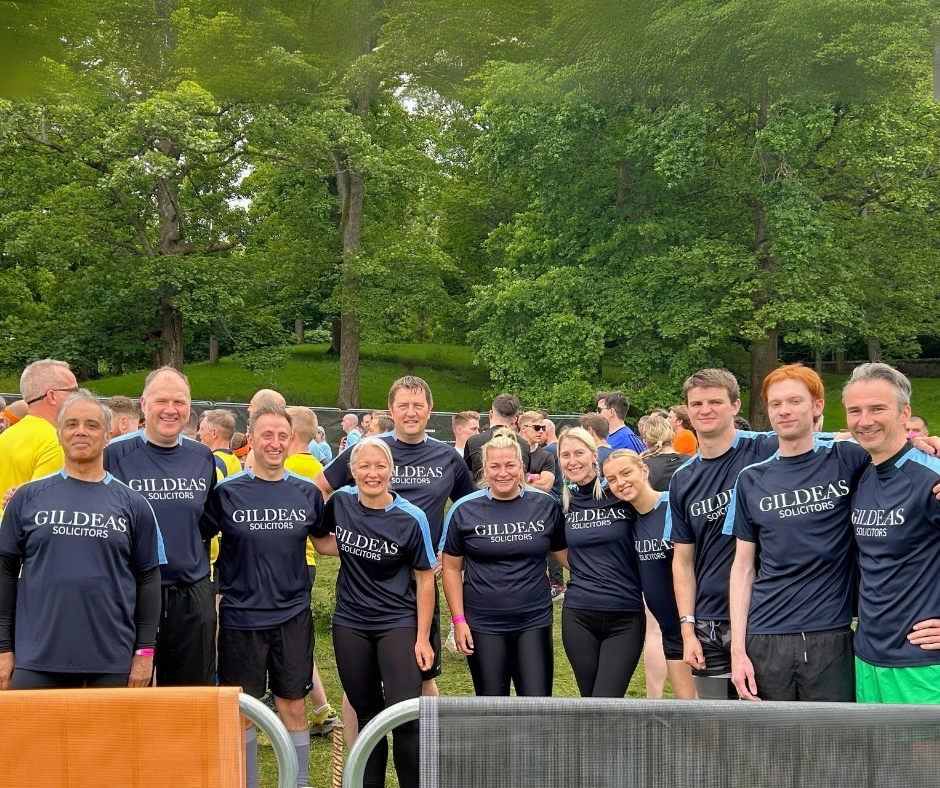
From Courtrooms to Ice Baths: Gildeas Takes On Tough Mudder for CRY
The team at Gildeas Solicitors traded their suits for sports gear this weekend as they took on one of the UK’s toughest endurance events – Tough Mudder Edinburgh – in support of Cardiac Risk in the Young (CRY).
On Saturday 7th June 2025, a determined group from our Glasgow and Edinburgh offices powered through 5 kilometres of mud, grit, and relentless obstacles including eight-foot walls, ice baths and the notorious cage crawl.
Why? To raise vital funds and awareness for a cause that hits incredibly close to home.
All For A Cause That Matters
We were proud to take on this challenge in loving memory of Dr Ashwin Bali, a remarkable young man from Glasgow who tragically passed away in March 2024 at just 26 years old due to Sudden Arrhythmic Death Syndrome (SADS). Ashwin was a much-loved Foundation Year 3 doctor working in Yorkshire, remembered for his radiant smile, his joy for life and the compassion he brought to everyone around him.
Following his passing, Ashwin’s family and friends raised over £21,000 for CRY, a charity dedicated to preventing young sudden cardiac deaths through screening, awareness and research. At Gildeas, we are proud to continue this mission by supporting CRY and helping to fund vital cardiac screening facilities across Scotland.
Not Your Average Legal Challenge
Taking part in Tough Mudder was no walk in the park. It tested every ounce of stamina and teamwork our solicitors had – but it was nothing compared to the daily challenges faced by families affected by sudden cardiac death. Every muddy step we took was in the hope of saving lives and sparing others from such devastating loss.
A Remarkable Effort
At time of publication, we have raised over £5.4k for CRY. The public response has been incredible, with local news, Glasgow Live covering the event.
We are deeply grateful to everyone who supported our fundraising efforts and can’t thank you enough.
Your donations help CRY continue its life-saving work, giving young people across the country the chance to be screened and protected.
Want to learn more about Ashwin’s story or support CRY’s mission? Visit Dr Ashwin Bali’s tribute page or go to www.c-r-y.org.uk to see how you can make a difference.
Together, we got muddy for a meaningful cause – and we’d do it again in a heartbeat.
Gildeas Solicitors is a recognised law firm specialising in personal injury claims, supporting you throughout Scotland from our offices in Glasgow and Edinburgh. We’re passionate about what we do, whilst putting our clients’ interests first. That’s why we make personal injury personal.
Considering our services? Call our dedicated team today on 0141 331 6070.
More to explore
World Bicycle Day: Time For A Truce?
- Home
- Archive by Category "Gildeas"
Share this article
Each year, World Bicycle Day gives us the chance to celebrate the many benefits of cycling – from improved health and reduced congestion to cleaner air and more liveable cities. But it’s also a moment to reflect on how we can foster better relationships between cyclists and other road users.
In 2025, that reflection is more important than ever.
Scottish Road Safety Data reported that from 2018 – 2022, there were 2,850 casualties from accidents involving cyclists.
Despite recent updates to the Highway Code, the roads are still fraught with confusion, frustration, and sadly, too often, conflict. The key to improving safety and harmony on our roads lies in mutual respect, education, and legal reform – supported by a clear understanding of the rights and responsibilities we all share.
Understanding Each Other’s Perspective
As ultra-cyclist Mark Beaumont recently noted in a radio interview, much of the current discourse around road safety is unhelpfully divisive. Cyclists using cameras to document close passes and dangerous driving is understandable – and in many cases vital for evidence. But when these clips are posted online, they can sometimes fan the flames of animosity rather than encourage change.
He asked an important question: “Do you just post hate and take a stance, or are you actually addressing the information?” His point is a crucial one. Whether behind the wheel or the handlebars, we must prioritise constructive conversations over condemnation. Most cyclists also drive. Many drivers cycle. We all want safe roads for ourselves, our families, and our communities.
The Highway Code: More Than Just Rules
The 2022 revisions to the Highway Code introduced a hierarchy of road users, placing the greatest responsibility on those with the potential to do the most harm. This includes crucial guidance on safe overtaking distances, giving way to pedestrians at junctions, and allowing cyclists to ride in the centre of a lane when it is safer to do so.
Yet public awareness of these changes remains dangerously low. A recent report co-commissioned by the Bikeability Trust revealed that only 70% of drivers believe that ‘cyclists have equal rights on the road as drivers’. This lack of understanding creates tension and confusion on the roads – and leaves vulnerable road users at increased risk.
Why We Need Presumed Liability
Chris Boardman, Olympic champion and cycling policy advisor, is one of many advocates petitioning for the UK to introduce presumed liability in civil law – a system already in place in many European countries. Under such a system, when a crash occurs between a driver and a cyclist, the motorist is presumed to be at fault unless proven otherwise.
Presumed liability helps reflect the principle of causative potency – the legal recognition that motor vehicles have a far greater potential to cause harm than bicycles or pedestrians.
It’s important to note – this doesn’t mean motorists are always to blame, but rather that the responsibility to take extra care lies more heavily with those operating heavier and faster vehicles.
Real-life cases show how the courts already account for this. In a collision between an HGV and a cyclist, for example, the driver was found to be 70 per cent responsible despite the cyclist’s own actions contributing to the crash. The rationale? The sheer size and danger of the vehicle meant the consequences of a mistake were far more severe.
Introducing presumed liability in law would reinforce this principle, make it easier for injured cyclists to seek justice, and encourage all drivers to adopt a more cautious approach around vulnerable road users.
Cultivating Safer Roads Through Empathy and Action
So how do we create safer, more harmonious roads?
The answer lies partly in education – not just for cyclists, but for all road users. There is still widespread misunderstanding about why cyclists take the lane, filter through traffic, or choose not to use poorly designed cycle lanes. Meanwhile, myths like “cyclists don’t pay for roads” continue to sow division.
We must also be willing to look beyond individual behaviour and towards systemic change. The upcoming Government Road Safety Strategy offers a golden opportunity to invest in safer infrastructure, introduce presumed liability, and promote better driver training.
Here are a few essential reminders for road users:
- Give space: Highway Code Rule 163 recommends giving cyclists the same passing room as a car – ideally at least 1.5 metres.
- Respect positioning: Cyclists often ride away from the kerb or even in the centre of the lane for safety, not stubbornness.
- Communicate clearly: Signal your intentions, check mirrors, and be mindful of cyclists filtering through traffic or approaching from behind.
- Stay calm: Most ‘anger’ from cyclists is fear – a natural reaction when one’s physical safety is at risk.
- Avoid assumptions: Just as not all drivers speed, not all cyclists jump red lights. Let’s avoid generalisations and focus on courtesy.
How Gildeas Solicitors Can Help
At Gildeas Solicitors, we understand the vulnerability cyclists face on the roads. Our specialist personal injury team has extensive experience helping injured cyclists seek compensation and justice after road traffic accidents.
We take into account the principle of causative potency when evaluating cases and are proud to support efforts to make the roads safer for everyone. If you’ve been injured while cycling, we’re here to help you understand your rights and explore your options for a claim.
We believe in roads that work for everyone – where children can ride safely to school, commuters can cycle to work confidently, and all road users can travel harmoniously.
Contact us today for expert legal advice and support if you or a loved one has been involved in a cycling accident.
Celebrate World Bicycle Day with peace of mind, knowing that if an accident occurs, you have a dedicated team ready to support you.
Gildeas Solicitors is a recognised law firm specialising in personal injury claims, supporting you throughout Scotland from our offices in Glasgow and Edinburgh. We’re passionate about what we do, whilst putting our clients’ interests first. That’s why we make personal injury personal.
Considering our services? Call our dedicated team today on 0141 331 6070. </span</p
More to explore
Motorcycle Safety Isn’t Optional, It’s Essential: Expert Tips Every Rider Should Know
- Home
- Archive by Category "Gildeas"
Share this article
Starting your journey as a motorcyclist is exciting. Whether you’ve just completed your CBT or a seasoned rider after some time away, May’s Motorcycle Safety Awareness Month is the perfect time to refresh your knowledge and prioritise safety.
At Gildeas Solicitors, we have experienced motorcycle riders within our legal team. We understand that keeping good habits and having up to date knowledge can prevent injuries and even save lives.
Owning a motorbike offers freedom and enjoyment, but it also requires some responsibility. Riders are far more exposed than car drivers and often less visible on the road, so being prepared and well informed can reduce the risk and ensure you enjoy each journey to the fullest.
Keep reading for our must-know safety tips every rider should follow.
Take Training Seriously
The Compulsory Basic Training (CBT) course is just the beginning. For those looking to build confidence and skill, further training can be invaluable.
RoSPA and other trusted providers offer advanced riding courses which teach you to handle different road conditions, assess hazards, and make safer decisions. These courses are especially useful if it’s been some time since you completed your CBT, or you’re returning to riding after an extended break.
Tip: Consider booking an advanced training session each year. It keeps your skills sharp and gives you more control on the road.
Prioritise Visibility
Many motorbike accidents happen because drivers simply don’t see the rider. Visibility should be one of your top priorities every time you ride.
To mitigate this, choose to wear bright or reflective clothing, especially when riding at night or in low light. Use dipped headlights even during the day to make yourself more noticeable. Fluorescent jackets, reflective tape and high visibility helmets can all improve how easily other drivers see you.
Tip: Don’t assume drivers have seen you. Make eye contact where possible and always position yourself to stay out of blind spots.
Invest in the Right Safety Gear
Investing in the right gear does more than meet legal requirements. It can reduce injuries, make riding more comfortable, and give you added confidence on the road.
Safety isn’t a luxury; it’s an absolute necessity. Always wear a high-quality helmet that meets British safety standards. Choose gear with built in armour for your shoulders, elbows, knees and back. Boots and gloves designed for motorcycling are also essential for protection and grip.
Visiting a dedicated motorcycle shop where trained staff can help with fit and recommendations can make all the difference.
Tip: Buying gear that’s AAA certified can give you added peace of mind. With AAA certification, this signifies the clothing has met or exceeded rigorous standards set by industry experts and organisations, such as material quality, impact protection, abrasion resistance, and ergonomic design.
Check Your Bike Regularly
Routine maintenance is essential for staying safe on the road. Before each ride, check your brakes, lights, oil, tyre pressure and chain tension. All of this can be done whilst you’re warming the engine, as you should always let the oil flow around the engine before moving off. If anything feels off, don’t ignore it.
Schedule regular servicing by a qualified mechanic and keep a record of your maintenance history. This can also support your case in the event of an accident.
Tip: Simple checks that take a few minutes can make a massive difference to your safety. Follow the BOLTS system for quick checks:
Brakes – Check both front and rear brakes before setting off.
Oil – Check the oil level on your bike with the dipstick or through the sight glass.
Lights – Check the lights work properly. Do you have any panel lights out? Do you have a spare for the headlight or tail light? Both are easy to replace, and we advise to carry spares.
Tyres – Check the tyre pressure according to the manual, but a ballpark figure of about 30psi is often normal. Check the tread depth, and if there are any splits or nails.
Steering – Check that the steering moves freely side to side, that there are no cables hindering it, and that it doesn’t feel loose or notchy as this indicates bearing wear.
Suspension – Put some weight on the front and then the back, see the suspension moving properly and then check there is no oil around where the shiny shaft goes into the seal.
Ride Defensively
Many road users won’t anticipate your movements or understand how quickly a motorbike can accelerate. Always ride as if others can’t see you or may make sudden decisions.
Maintain a safe following distance and avoid weaving through traffic. Be cautious at junctions and roundabouts, where many accidents involving motorcycles occur.
Tip: Watch for clues from other vehicles, such as wheels beginning to turn or drivers shifting in their seats. These signs can help you anticipate their next move.
Understand the Road Conditions
Scotland’s roads can be unpredictable. From potholes and loose gravel to changing weather and sharp bends or country roads, riders unfortunately need to stay alert at all times.
To mitigate this, ensure you leave plenty of time to slow down in wet or icy conditions and avoid sudden braking. Rural roads, especially in the Highlands and Borders, may have blind corners or livestock crossings, so take extra care.
Tip: Always adjust your speed and riding style based on road and weather conditions, not just the speed limit.
Know Your Legal Rights
Even with the best preparation, accidents can still happen. If they do, knowing your rights is crucial.
At Gildeas Solicitors, we specialise in supporting motorcyclists following accidents. We can help you understand whether you are entitled to compensation and guide you through the legal process with dedication, compassion, and experience.
Conclusion
Starting out on two wheels can be one of the most rewarding decisions you make, but it comes with responsibility. Motorcycle Safety Awareness Month is a time to commit to good habits, proper equipment, and ongoing training.
The more you invest in your safety now, the more confident and prepared you’ll be – whatever the road brings.
Need Legal Advice After a Motorbike Accident?
If you or someone you know has been involved in a motorcycle accident, contact Gildeas Solicitors today. We offer expert legal advice tailored to riders and can help you get the compensation and support you deserve.
Gildeas Solicitors is a recognised law firm specialising in personal injury claims, supporting you throughout Scotland from our offices in Glasgow and Edinburgh. We’re passionate about what we do, whilst putting our clients’ interests first. That’s why we make personal injury personal.
Considering our services? Call our dedicated team today on 0141 331 6070.
What the Law Says About Motorbike Safety in 2025 - And Why It Matters
Riding a motorbike offers a sense of freedom and control that few other modes of transport can match. But with that freedom comes risk, especially in Scotland, where winding roads, unpredictable weather and rural traffic all present unique challenges for riders.
Motorbike Safety Awareness Month 2025 serves as a reminder not only to check your bike and riding habits but also to understand how the law is evolving to protect you. From tougher penalties for careless drivers to new legal protections for vulnerable road users, the landscape is changing.
In this blog, Gildeas Solicitors outlines what every motorcyclist in Scotland needs to know about recent and upcoming legal changes and how they can affect your rights and motorbike safety on the road.
Stronger Penalties For Dangerous Driving
In response to growing concern over road safety, the courts now have greater sentencing powers. Drivers who cause death by dangerous driving can face life imprisonment. Serious injury by careless or dangerous driving now carries heavier penalties than ever before.
Why it matter for bikers:
Motorcyclists are among the most vulnerable road users. When a crash is caused by someone else’s recklessness, it is vital that the law delivers justice. These tougher penalties reflect the seriousness of the consequences for bikers and their families.
Highway Code Updates Offer More Protection
The 2022 update to the Highway Code introduced a hierarchy of road users. This places a higher level of responsibility on those operating larger and potentially more dangerous vehicles.
Motorcyclists, along with cyclists and pedestrians, are now considered priority users. Drivers are required to give greater space when overtaking and must give way to motorcyclists at junctions.
Why it matters for bikers:
These changes are aimed at reducing the number of common accidents involving motorcyclists. However, they rely on other drivers knowing and respecting the rules.
If you are injured because someone ignored them, you may be entitled to make a claim.
Focus On Advanced Rider Training
While Compulsory Basic Training (CBT) remains the legal entry point for riding, there is increasing encouragement for motorcyclists to undergo further training.
Police Scotland continues to promote Rider Refinement courses, especially in areas with high collision rates such as the Highlands, Argyll and Bute, and the Borders. Refresher training is also recommended for returning riders, particularly those over 35.
Why it matters for bikers:
Ongoing training not only makes you safer but can also help support your case in the event of a crash. It demonstrates responsible riding and reduces the risk of fault being unfairly assigned to you.
Use of Camera Footage in Legal Claims
Helmet cameras and dashcams are becoming standard equipment for many riders, and for good reason. The footage is increasingly accepted in Scottish courts as valid evidence in both criminal and civil cases.
Why it matters for bikers:
Video footage can make all the difference when liability is disputed. At Gildeas, we work with clients to gather and present this type of evidence effectively, helping to build a stronger case.
Debate Around Presumed Liability
While not yet in effect, there is growing support across the UK for a presumed liability system. This would place the responsibility on drivers to prove they were not at fault when colliding with a vulnerable road user such as a motorcyclist.
Similar laws exist in several European countries and are designed to improve safety by increasing driver awareness.
Why it matters for bikers:
Although still under discussion, the introduction of such a policy would significantly strengthen a motorcyclist’s legal position in the aftermath of an accident.
Gildeas Solicitors - Legal Support That Understands Riders
At Gildeas, we understand the challenges that bikers face both on the road and in the legal system. If you are injured in a motorcycle accident, it is important to work with a legal team that not only understands the law but also understands motorcycling.
We can help with:
- Access to medical experts and rehabilitation specialists
- Coordination of evidence, including camera footage and witness statements
- Support for vehicle and home adaptations if needed
- Pursuit of full compensation for injuries, lost income and care costs
We’ve helped clients recover millions of pounds in compensation after life altering accidents. Whether your injury is minor or severe, we are here to fight for what you deserve.
If the worst happens, we're here
Motorcycle Safety Awareness Month 2025 is not just about checking your tyres or wearing high visibility clothing. It is also about staying informed. The law is changing and in many ways, it is starting to work more in favour of riders.
Understanding your rights and responsibilities can help you ride more safely and confidently.
And if the worst does happen, knowing where to turn for legal support can make all the difference.
Need Legal Advice After a Motorbike Accident?
If you or someone you know has been involved in a motorcycle accident, contact Gildeas Solicitors today.
We offer expert legal advice tailored to riders and can help you get the compensation and support you deserve.
Gildeas Solicitors is a recognised law firm specialising in personal injury claims, supporting you throughout Scotland from our offices in Glasgow and Edinburgh. We’re passionate about what we do, whilst putting our clients’ interests first. That’s why we make personal injury personal.
Considering our services? Call our dedicated team today on 0141 331 6070.
What Happens Next In Your Personal Injury Claim
- Home
- Archive by Category "Gildeas"
Share this guide
We know making a personal injury claim can feel overwhelming. Waiting for an update on your case can feel frustrating, and legal terms can be confusing.
Our team have broken down the claim process below to help give you practical support and peace of mind.
In this guide, we’ll cover everything you need to know about what happens in your case:
- The first steps
- Establishing what happened
- Making an evaluation of the case
- Building the case
- Medical evidence
- Negotiations
- The court process
- Settlement and receiving damages
The first steps
- Whether you contacted us first or have been referred, we’ll complete initial forms to get your details. We can do this over the phone or send them out via email or post.
- We’ll also send our T&Cs and require a form of ID – this could be a utility bill, bank statement, as well as photographic ID such as your driving license or passport. These are required by law for us to comply with anti-fraud legislation.
- After we receive this and you’re still happy to proceed, we’ll then send you an official letter to say we’ve began the claim process. This is called an Intimation of Claim and is sent by email or post.
Establishing what happened
- We’ll ask your account of what happened in our first contact over the phone. We may ask questions such as whether the police attended, if there were witnesses, and if you went to hospital or attended the GP after the accident.
- We’ll then ask you to submit evidence of what happened. This could be photo/video evidence, (e.g., vehicle damage or dash cam footage).
Making an evaluation of the case
- We work on a no-win, no-fee basis. So depending on the information you’ve provided, we may know at this stage if your case has enough evidence to progress. If we’re unable to proceed, we will tell you at this stage.
- If we can proceed, we’ll begin to send enquiries to the third-party insurers (TPI) and any other relevant parties (E.g., the police, or in cases of uninsured/untraced drivers, the MIB). This is to find out what happened from their side and most importantly, to find out who was at fault for the accident.
Building the case
To further build the case, we attempt to collect as much information as possible. We will never attempt to settle your case without obtaining the correct evidence, so that you have as strong a claim as possible.
- After we’ve received vehicle damage photos – depending on the extent of the damage and the circumstances of the accident – we may ask for specialist opinion from an engineer. Their report will help to build our case and establish who was at fault. This can take some time to carry out a thorough assessment.
- There is usually a period of waiting at this point in the process as we build the case. It can take time to hear from the third party and other groups.
Medical evidence is crucial to the case
- We might ask you to sign a form to release your medical records. This is called a medical mandate. We do this to understand what the hospital or GP said about your injuries when the accident happened. These are especially important if the accident happened a while ago and you’re making a claim month or years down the line. Records can take some time to receive too.
-
- We might ask you to undergo a medical exam by an independent medico-legal specialist. Depending on your injuries and if you’re still recovering, we might wait until you feel better to do this, e.g., until you’re out of hospital.
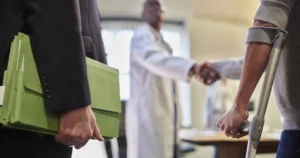
This is typical in any personal injury case and is done so we have an unbiased understanding of your injuries. The expert then provides a report to be used in your case. This can take a while for a number of reasons – e.g., appointment slots with the examiner, or the report could take time for us to receive.
- We might ask you to undergo a medical exam by an independent medico-legal specialist. Depending on your injuries and if you’re still recovering, we might wait until you feel better to do this, e.g., until you’re out of hospital.
- The examiner might make treatment recommendations depending on your injuries and how you’re feeling after the accident such as certain medication, or specialist help like physiotherapy or counselling. Some of this might not be available on the NHS, so we can refer you to our trusted providers if you wish. These can also take time to organise, particularly if your injuries are more serious.
Negotiations begin
- Depending on the nature of the accident, we may not need extensive medical evidence. With minor injuries and smaller claims, the third party may accept fault, so the case can be resolved quickly. When this happens, we may receive a settlement offer early on. This is called a pre-med offer.
- If we receive a pre-med offer, we will give you our advice and take your instructions on what to do next – either to accept it or reject. If you choose to decline the offer, we’ll give you our legal opinion and then begin negotiating with the third party on your behalf.
- There are many factors which can affect your ongoing claim at this stage. We may require further evidence, or new elements could arise in the claim. For example, when calculating more complex elements of the claim such as your loss of earnings, waiting on responses from the third party, etc.
- In more complex cases, there may be other factors which could affect the claim process – for example, in claims with an untraced driver, or serious injury cases where your life has been significantly changed as a result of the accident. In any case, we’ll ensure you’re kept informed at every stage of the process.
The court process
-
- The majority of our claims never end up in court. In the unlikely event that they do, we will ensure that you and any witnesses are completely prepared.
- There are specific procedures for personal injury claims in Scotland, particularly with smaller claims. If your case goes to court, we will fully explain the process with you and what we expect the outcome to be.
Settlement and receiving damages
- Once you agree on a settlement offer, the third party has five weeks to process and send the compensation.
- We then deduct the costs of our fees and any other costs incurred from your case before sending you the final settlement.
You should contact your claim handler in the first instance if you would like to discuss your case or if you have any questions.
You can contact them via email or by calling 0141 331 6071 followed by their extension.
Got a general query? Fill out our contact form or call 0141 331 6070.
This list is not exhaustive and is intended as an informative guide to the process of making a personal injury claim at Gildeas Solicitors only. Our claims process will differ in every case, as it is entirely dependent on your individual circumstances.
We act only for the pursuer and take instructions from them on a no-win, no-fee basis.
Gildeas Solicitors is a recognised law firm specialising in personal injury claims, supporting you throughout Scotland from our offices in Glasgow and Edinburgh. We’re passionate about what we do, whilst putting our clients’ interests first. That’s why we make personal injury personal.
Considering our services? Call our dedicated team today on 0141 331 6070.
Advocacy Meets Empathy: Our Role This Mental Health Awareness Week
Mental Health Awareness Week takes place from 12th – 18th May 2025. The annual event was created more than 20 years ago by the Mental Health Foundation to bring the UK together to focus on mental health.
Their report, The State of the UK’s Mental Health found that nearly two thirds (65%) of people in Scotland say they have experienced a mental health problem, and more than 4 in 10 people say they experienced depression.
To mark Mental Health Awareness Week, Gildeas Director Emma Thomson discusses the impacts an accident can have on our client’s mental health, and the support available for those affected.
Recognising the effects of mental health
As a certified trauma-informed personal injury solicitor, Emma represents individuals who can come from all walks of life. She said, “Trauma comes in different shapes and sizes, and can impact each of us in different ways. It can arise from their accident, or an unrelated trauma - past or present.”
Many of our clients seek support from Gildeas having experienced a traumatic accident or life event, and some may go on to receive a specific diagnosis. Below we cover some of the conditions often seen in personal injury cases.
Anxiety and depression
Physical injuries often lead to unexpected lifestyle changes such as a loss of mobility and loss of independence. This can lead to feelings of hopelessness and sadness, which can escalate into clinical depression.
Depression is typically thought of as experiencing low mood, but it can also look like feelings of irritability, anger, or feeling ‘numb.’ Many clients also report physical symptoms of poor concentration and memory, trouble sleeping, or reduced appetite.
The fear of re-injury or general anxiety about safety can become overwhelming after an accident. Anxiety can manifest as panic attacks, obsessive worrying, or avoidance behaviours such as avoiding using the car or going near the location of the accident.
Trauma-related psychological injuries and PTSD (Post-traumatic stress disorder)
Mental health charity MIND define trauma as “When we experience stressful, frightening or distressing events that are difficult to cope with or out of our control.” Significantly, the effects of trauma can be long-lasting, and can remain well after the physical effects of an accident have passed. This can sometimes develop into post-traumatic stress disorder (PTSD).
PTSD UK estimate that around 1 in 10 people go on to develop PTSD at some point in their lives, and list road traffic accidents as one of the most common examples of a traumatic event. Their studies show that about 25-33% of people involved in a road accident may develop PTSD within 30 days. Symptoms may include intrusive thoughts, nightmares and flashbacks, avoiding reminders of the trauma (such as avoiding driving or getting into a vehicle), low mood or disassociation, difficulty sleeping, and being constantly on edge (hypervigilance), and more.
Adjustment disorder
Following an accident, people often struggle to adapt to new circumstances, whether it’s from reduced mobility or ongoing pain. This emotional difficulty can be classified as an adjustment disorder. This is usually seen as less severe than PTSD. For example, the symptoms may be temporary and start to ease as the client recovers from their physical injuries. Symptoms can include low mood, trouble sleeping, anxiety, and avoidance behaviours.
Somatic symptom disorder
Somatic symptom disorder (SSD) occurs when a person feels extreme, exaggerated anxiety about physical symptoms which can interfere with their daily functioning. This can occur even when there has never been an underlying physical injury, or when the original physical injury has resolved but symptoms persist.
SSD is complex and can be difficult to diagnose, as although the pain they experience is very real, those with SSD can be unaware of the psychiatric nature of their symptoms.
Advocating for recovery, not just compensation
We believe that legal representation should be tailored to your needs, which is all the more important in clients who may have experienced trauma. We have a number of practices designed to support claimants with compassion and clarity.
We offer the right person for your case
With certified trauma-informed solicitors in our legal team, we understand how to approach sensitive conversations with care, and create a safe, respectful environment for each and every client.
We ask the right questions
We aim to collect the information we need to pursue your case whilst ensuring your wellbeing is at the heart of what we do. Gildeas Director, Emma Thomson said, “I’m honest and up front with clients about what information I and others need from them, and I offer them a choice in how they provide this information. For example, I’ll explain clearly at the onset that a meeting, medical examination, or court appearance could be a difficult experience for them. I explain how long it might last and offer, where possible within my control, the option to pause or arrange a further time to discuss.”
We refer you to the right experts
We work closely with medical professionals and mental health specialists to ensure your psychological needs are recognised in your claim. We’ll always endeavour to signpost you to the correct tools or support organisations to help you look after yourself, which may include medication, cognitive behavioural therapy (CBT), further counselling, or a combination of these to help support your recovery.
We offer the right strategies
Managing claims can be even more challenging for those with mental health symptoms, and no one’s experience of trauma is ever the same. We offer greater flexibility and control to help reduce stress during the process.
Emma explained, “I adapt to the individual clients and understand that their needs will differ depending on their circumstances. For example, offering clients a choice on the location, format, or timing of meetings. I also consider if I need to make alternative arrangements for obtaining evidence from them. For example, do we need to arrange another time to take their evidence, or should it be done over multiple meetings. I hope by giving control to clients, it minimises the risk of re-traumatisation.”
Other services, such as:
- Childminding
- Looking after pets
- Gardening
- DIY and home maintenance
- Driving. This includes mileage and parking. Again, this would only be for anything related to your injuries. For example, if you needed picked up or dropped off at doctors/hospital appointments.
What you can do
Our clients have a part to play when recognising their own mental health needs. For example:
Communicate with us
Many people still feel a stigma around mental health which can discourage them from discussing it. We understand that we may be the first person you’ve opened up to, and you might be embarrassed to do so. Whilst we understand that talking about parts of your claim could be traumatic, it’s important to be upfront about your symptoms so we can support you effectively as your legal advisor.
A crucial factor is being open about what kinds of support you may need. Please tell us if there are adjustments we can make, e.g., meeting in a different format, or giving evidence in a different way.
Understand and manage your expectations of the claim process
For some claimants, receiving financial compensation might feel like an underwhelming conclusion rather than the closure or justice they had hoped for.
That’s why it’s so important for clients to understand and manage their expectations – for example, start by checking our FAQs or services pages for further information on the process.
We aim to be clear about what a personal injury claim can - and cannot - achieve. We’ll always explain the process to the best of our ability – ensuring you know what it involves, what we require from you, and what the ultimate outcome may be.
Conclusion
At Gildeas, Mental Health Awareness Week is a chance to highlight the often-overlooked emotional impact of personal injury. We’re committed to supporting our clients with empathy, understanding, and practical solutions that recognise the full scope of their recovery. Whether it’s adapting how we work, offering access to expert mental health support, or simply making space for honest conversations, our goal is to make the legal process more manageable.
This Mental Health Awareness Week, we encourage anyone impacted by injury to reflect on their wellbeing, reach out for support, and know that you don’t have to face the process alone. Your story matters, and we’re here to listen.
Gildeas Solicitors is a recognised law firm specialising in personal injury claims, supporting you throughout Scotland from our offices in Glasgow and Edinburgh. We’re passionate about what we do, whilst putting our clients’ interests first. That’s why we make personal injury personal.
Considering our services? Call our dedicated team today on 0141 331 6070.
